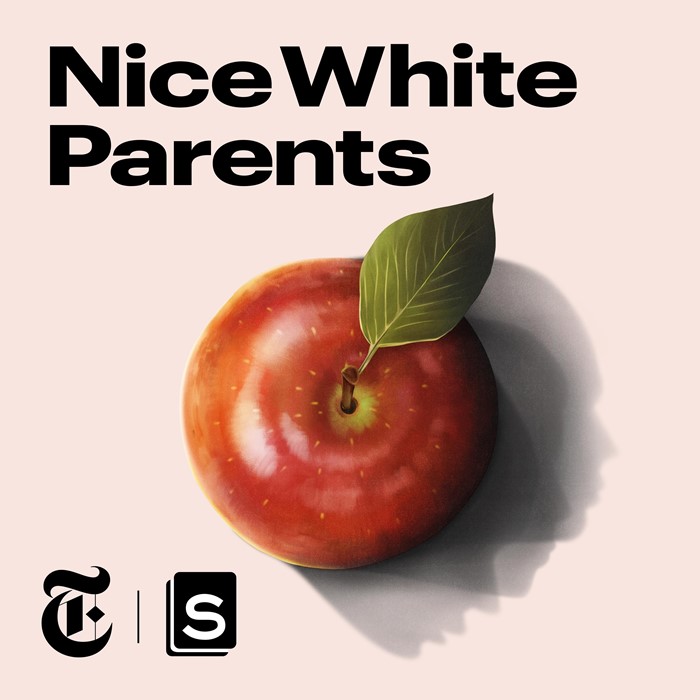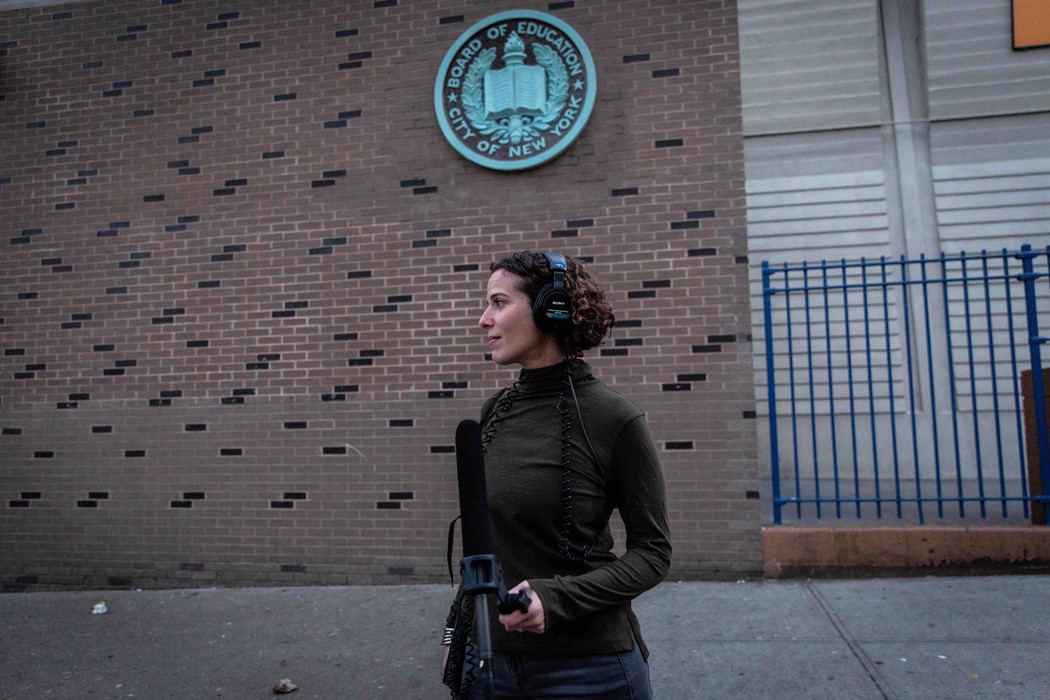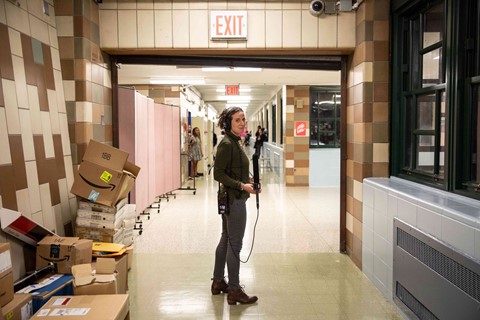Reporter Chana Joffe-Walt and producer Julie Snyder discuss the making of their podcast, which explores the most powerful force in the American public school system: white parents
“Disgusting,” reads one review of Nice White Parents. “Horrible podcast by extremely racist people,” reads another. “Let’s blame white people for everything,” writes I.Jones_95. “A self -loathing white lady blaming white people for first-world problems” says Mrdudesirmanguyhim. One author, writing under the name JJRooster used the full character limit for their Apple Podcast review to repeat the word “Racist” 92 times in a telling post titled simply, “Racist”.
None of these users had listened to a single episode of the show. The podcast, a Serial and New York Times production hosted by This American Life’s Chana Joffe-Walt, didn’t release its first episode until July 30 this year. The final episode didn’t air until August 20. Mrdudesirmanguyhim, I.Jones_95, JJRooster and a flurry of other one-star reviewers were spurred to action by the release of a two-minute, 54-second trailer which debuted on July 17. An audio clip, less than three minutes long, was all it took to draw the enraged scrutiny of a hoard of right-wing trolls. “That shocked me at first,” says Nice White Parents’ producer Julie Snyder. “I remember I sent Chana an email that just said, ‘I think we walked into the middle of someone else’s culture war.’”
Just days before the fateful release of Nice White Parents’ trailer, President Trump had delivered a dark and divisive speech, rallying his supporters to battle against what he saw as “a new far-left fascism”. “Our nation is witnessing a merciless campaign to wipe out our history, defame our heroes, erase our values and indoctrinate our children,” said the President. Without realising it, Nice White Parents had become one of a host of cultural objects that offered proof of the new liberal dogma – one that prioritised white guilt over the glossy, rose-tinted story of American exceptionalism. “A wave came over that felt like, ‘Oh my gosh!’” says Snyder. “Sarah [Koenig, host of Serial] wrote me a really nice note after the trailer came ou that just said, ‘I’m here and this is going to be more attention than you’re used to ... please reach out to me to talk about it anytime.’ That felt very nice,” adds Joffe-Walt.
Then, almost as quickly as it had flared up, it was gone. The uproar lasted for only a handful of days. Snyder isn’t quite sure why, but suggests that a combination of short attention spans and a realisation that this was in fact a show that focused its criticisms on liberal white people, caused the swell of hatred to lose steam. Despite occasional comments for the podcast to “quit being racist” – which still continue to crop-up in rogue one-star reviews – listeners and critics alike have universally lauded Nice White Parents, and rightly so. It is without doubt one of the most timely, astonishing and insightful podcasts released in recent years. Joffe-Walt’s reporting is gripping and excruciating in equal measure as she spotlights the missteps and micro-aggressions of seemingly ‘progressive’ white parents in their quest to improve their local school system.

More than five years in the making, Joffe-Walt began reporting Nice White Parents back in 2015. Working with New York Times Magazine writer Nikole Hannah-Jones on what would become the Peabody Award-winning The Problem We All Live With, she began making some preliminary recordings at Cobble Hill’s School for International Studies (S.I.S.) in her home neighbourhood of Brooklyn, New York. Ultimately S.I.S. wouldn’t feature in The Problem We All Live With, but Joffe-Walt kept returning to the school to see if she could catalogue the ways integration was impacting the lives of parents and students as it played out in real time. “I tracked what happened, and that made me curious about the history of the school,” she says. Once she’d found out exactly what that history entailed, she knew she had to push further. “When Chana found the letters,” says Snyder, “I felt like, OK, we genuinely have a story to tell.”
Written in 1963, almost exclusively by white parents, the letters Joffe-Walt had uncovered demanded that New York City build S.I.S. nearer to the district’s white neighbourhoods. “It’s a decade after Brown versus Board of Education,” they said. “Schools should be integrated.” The Board of Education agreed, changed the entire plan and located S.I.S. where the white parents wanted it. When S.I.S. finally opened its doors, none of the white parents sent their kids there. The astonishing inconsistency of this decision struck Joffe-Walt and Snyder. “You had people calling for integration,” says Snyder, “but that did not happen.” The focus for the series became clear – “How are we still in the same place 60 years later?”
In the beginning, as she had while working on The Problem We All Live With, Joffe-Walt thought that integration was the primary issue her story would explore. “I really was pretty focused on segregation, and the need for public schools to be integrated,” she says. “I’d become fairly convinced that segregation was this fundamental fact that was shaping all these other discussions about the problems with public education.” It wasn’t until she was much further in development that Joffe-Walt began to recognise a different driving force in America’s school systems. During the course of her reporting, she and Snyder met with sociologist, scholar and poet Eve Ewing to discuss an early draft of what would become Nice White Parents. “I remember walking her through the story as far as we knew,” says Joffe-Walt. “Telling her what had happened at the school and Eve just saying, ‘Why are you so obsessed with integration? What is it about integration that you find so compelling?’ That was a very challenging question that both of us kept coming back to over and over again.”
As she gradually turned away from integration, Joffe-Walt began to explore another force that she thought might be influencing America’s unequal education – a force that would eventually lend its name to the podcast. “I looked at the way white parents moved through the schools; what they said they wanted; and the insidious ways in which those choices shaped the conditions in a school building over so many years, even years when white parents weren’t present.” The more she investigated, the more seemingly benign observations – PTA fundraising, ‘gifted’ programmes, school discipline, district boundaries, all things that at first glance seem like sensible, practical necessities – end up entrenching a system that privileges white kids at the expense of Black and brown children.

As she pursued this new angle, Joffe-Walt became increasingly conscious of her identity and its implications for the story she was telling. “It was evident to me that it was important to say who I was relative to the story,” she says. “That I identify with lots of the white parents in this series, that I am a white parent, that these are all questions I’ve thought a lot about too and that’s what makes me interested in it.” She needed the listener to know how she was relating to the material – it would be untenable for her to tell the story of Nice White Parents without acknowledging her own perspective on its subject matter. “Part of the thread that is carrying you through the episodes is the questions that I’m bringing to what I’m seeing,” she says. “I talk about my own experience when it helps move the story along.”
Sitting moments of hope, side-by-side with the unavoidable acknowledgement that S.I.S.’s history seems doomed to repeat itself, Nice White Parents teeters between optimism and skepticism across five unpausable episodes. “A lot changed over the time I was reporting this story,” says Joffe-Walt. “A lot changed in the consciousness and awareness of liberal progressive white parents and our understanding of our own relationship to systemic racism,” she says. “We’re talking more, and making some different choices, but I’m not sure how that leads to any sort of fundamental change. The actual material circumstances on the ground seem to be moving in the opposite direction, towards increased inequality.” Perhaps the most intriguing reaction Joffe-Walt now sees online are comments from people who say they’re “cringing listening”. That’s a feeling she understands to some degree. “I think that means you recognise yourself,” she says. “Maybe it’s a useful feeling to lean into, and to use to push towards creating change.”
All episodes of Nice White Parents are available to download now.
